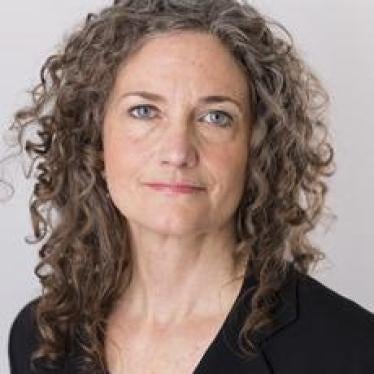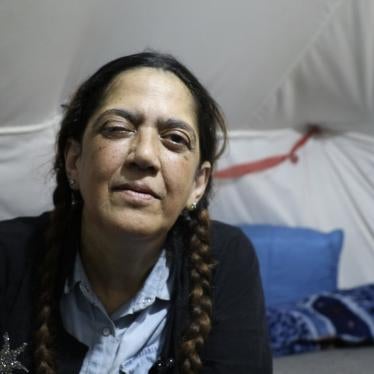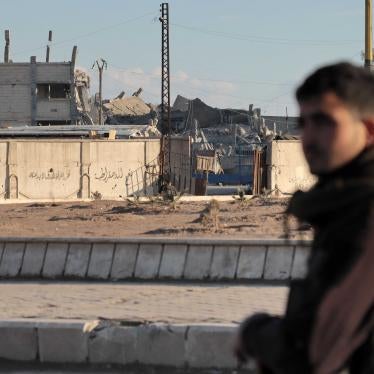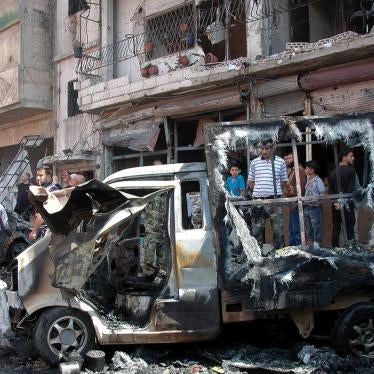ERBIL, Iraq – Seated in a metal chair, with his skinny legs barely reaching the floor and his voice almost a whisper, “Ali,” 14, pushed up his shirt sleeves. The thin scars near one elbow, he said, were from electric shocks. The dark, circular scar near one wrist, he said, was a cigarette burn. The torturers, he said, were agents of Asayish, the Kurdistan Regional Government (KRG) security forces.
Ali had ended up behind bars in Iraqi Kurdistan after Asayish said he confessed to joining the Islamic State. “At first I did not confess,” Ali said. “Not until the last round of beating. Then I confessed straight away.” He denied ever having joined the Islamic State – it was only the torture, he insisted, that forced his confession: “[T]hey told me, ‘You have to confess.’”
Ali is among more than 180 Iraqi boys, most of them Sunni Arabs who had lived in Islamic State-held areas, whom Asayish is detaining as alleged Islamic State members in two KRG juvenile detention centers. A fellow Human Rights Watch researcher and I interviewed 19 of these boys, some as young as 11 years old, in December at a detention center in Erbil, the capital of Iraqi Kurdistan, where most are being held.
We entered the detention center expecting to speak with the boys about life under the world’s most notorious armed group. But we quickly discovered that these children were victimized twice — first by the Islamic State, which they said was constantly trying to enlist them as fighters, and then by members of Asayish.
All but two of the boys with whom we spoke told us that Asayish agents had tortured or beaten them into confessing before bringing them to the detention center in Erbil. Many said they had not been able to see or speak with family members for weeks or months after their capture, if at all. This was sometimes because Asayish would not let them, and at other times because they did not know how to reach them. None appeared to have had a lawyer during interrogation by Asayish, and as best they and we could determine, none had been formally charged.
More boys accused of involvement with the Islamic State are arriving at the detention center every week. Some may have committed crimes with the jihadi group, or otherwise pose a serious security threat. But in many cases, there may be no grounds whatsoever for detention.
While we can’t speak to the guilt or innocence of these boys, we have no doubt they have been severely traumatized. Two boys said they wanted to kill themselves, and social workers at the detention center told us many more boys were suicidal as well.
Asked for comment, Dindar Zebari, the KRG’s point man for international organizations, denied that any children were abused, saying, “The KRG deals with them as victims, not criminals.”
The government is “dedicated to following up on the allegations,” Zebari wrote us, but added that “no cases have been reported against the arrest procedure or misconduct at arrest by Asayish against a civilian.” But since most if not all the boys remained without a lawyer even after their transfer to the detention center, how would they file a complaint?
KRG officials did not respond to several of our questions, including how many other child suspects were being held in places other than the juvenile detention centers, such as Asayish bases.
The 180 boys were picked up in Iraq’s semi-autonomous Kurdistan Region starting in July. They were fleeing Islamic State-held areas, including Mosul, where Iraqi forces are waging a protracted battle to rout the extremist group. Many boys were taken from camps for civilians displaced by the fighting, while others were captured fleeing areas closer to the front line. We interviewed the 19 boys separately inside a locked, gated compound, away from the eyes and ears of detention center staff. We are changing their names and omitting certain details of their accounts to protect them from reprisal.
The boys said most of the torture took place during interrogations at the Asayish headquarters in Erbil, known as Gishti, where some were held for days or weeks before being brought to the detention center. Some said they were tortured at Asayish regional offices in Kirkuk, Makhmor, and other areas controlled by the KRG.
The boys said Asayish officers blindfolded them and beat them with plastic pipes, often repeatedly over several days. Some said the Asayish agents handcuffed them with their arms twisted behind their backs in painful positions, or hung them from the ceiling. Nine boys said the Asayish agents tortured them with electric shocks, in two cases after dousing them with water. Most said the agents zapped them by attaching wires to their limbs — one boy said the wires were connected to an “electricity machine” that made him feel “like my eyes were popping out.”
“Omar,” 15, said he passed out from the pain. “I was blindfolded, and they put a bag over my head,” he said. “They slapped me on the face, they beat me with a plastic pipe and a broomstick on my arms and my back and my chest.
I was seated on a chair with my hands tied behind my back. They beat me over and over. I didn’t confess until they started the electric shocks. I fell to the ground and lost consciousness. When I woke up I told them, ‘I will tell you anything.’”
Fourteen-year-old “Yassir” said he confessed after an Asayish interrogator taped a towel over his face, repeatedly beat him with a plastic pipe, then started pulling down his pants and told him, “I will f- you if you don’t say you are ISIS.”
This is not the first time Asayish and other KRG forces have been accused of torturing terrorism suspects into forced confessions. Human Rights Watch documented the practice in 2007, and although the KRG has taken several steps over the years to protect detainees, Amnesty International raised the issue again in October.
Though most of the boys denied any links to the Islamic State, seven admitted they had associated with or formally joined the group. They said they worked as checkpoint guards or cooks – none said they had fought with the Islamic State. Some said they had enlisted voluntarily or to earn money for their families. Others said the Islamic State lured or threatened them into joining or attending Quran studies and weapons training. But even those admissions usually weren’t good enough for their interrogators, they said, who tortured them until they embellished their stories by saying they had been fighters. None of the boys was sure of the content of the written confessions they were made to thumbprint – the Asayish interrogators did not give them copies, and in any case they were in Kurdish, which only one of the boys we interviewed could read.
The apparent violations didn’t stop there. Most of the boys said they had been questioned by a man they thought was a judge at Asayish headquarters in Erbil, but almost always days after they had been picked up, not within 24 hours of arrest, as KRG law requires. None of the boys we interviewed thought he had yet been charged with a crime. Two Erbil-based children’s rights advocates with knowledge of the cases, who spoke on condition of anonymity, said they believed that was correct. The Iraqi criminal code specifies that suspects must be charged within six months, absent an extension from a judge.
Even after they were transferred to the detention center, many of the boys said, they had to wait weeks or months to receive visits or even call a family member – and a few were still waiting. In some cases, they said, Asayish officials, citing security concerns, did not let them see or call their loved ones even when they gave them their phone numbers.
“All I want is two minutes to call my family and tell them, ‘I am alive,’” said “Ammar,” 16, one of several boys who pressed crumpled pieces of paper with the phone number of a father, a mother, or an uncle into our hands. Ammar said another boy from his village who later arrived at the detention center expressed surprise when he saw him, telling him, “Your family thought you were dead.”
Eleven of the boys we interviewed said they had not been able to speak with or see their relatives since they had been detained, in some cases for months. Only five boys said their family members had been able to visit, though a sixth boy was expecting a visit the following week. Only four boys – two of whom also had visits – said they had been able to call their parents. They said Asayish monitored their calls, and in some cases cut them off after only two or three minutes.
We also spoke with several family members of the detained boys. A few were desperate, having no idea of their children’s whereabouts. “Where is Mahmoud? Can I talk with him? Is he sick?” one mother asked frantically. One man, an uncle of a detained boy, said his nephew was an Islamic State member and hung up.
Some family members said that Asayish had given them permission to visit their detained relative, but that they still could not get into Erbil because the Asayish agents at checkpoints were routinely barring Sunni Arabs displaced by fighting from entering the city.
“Umm Ali,” the mother of 16-year-old Ali, said she only received a call from KRG authorities four months after her son had been taken from a camp for Iraqis displaced from Mosul. Although she had family members in Erbil who could vouch for her, it took her another month to receive permission to see her son. Umm Ali said that on that first visit, “He was not the son I knew. He was gaunt, exhausted – in shock.”
Umm Ali scoffed at the idea that her son would join the Islamic State. The group’s enforcers had threatened Ali’s father, forcing him to flee; they had looted the family’s home and destroyed the family’s car. A suicide bombing in 2008 by the Islamic State in Iraq, a precursor to the Islamic State, had killed Ali’s brother, an Iraqi policeman.
Some of Ali’s friends had joined the Islamic State and the group’s recruiters tried many times to make him join, Umm Ali said, but when they came to the house she would hide her son. Once when they found him, she said, they dragged him to a detention center and whipped him.
“My boy was abused by the Islamic State and then he was tortured by Asayish,” Umm Ali said. She burst into tears. “Why would he join ISIS? Why was he tortured? He is only a child.”
Ali and his mother were among several boys and their parents who said Asayish officers took the children based on false tips from local informants who bore grudges against their families. Ali said that in his case, the informant was a young man who had fought with him when the informant tried to steal some of the family’s pigeons, and failed to repay them a debt of roughly $213.
If Ali’s story is true, his price for that feud was being snatched by Asayish from a camp for war-displaced, blindfolded and beaten with plastic pipes at an Asayish field base, then tortured repeatedly over three days at Asayish headquarters in Erbil.
Ali was the only boy we interviewed who said he dared tell a judge – or at least a man who briefly questioned him at Asayish headquarters who he thought was a judge – that he had been tortured. “He asked me about how I was treated,” Ali said. “I told him I was innocent and that I confessed because I was beaten.”
The man’s response, he said, was: “You have already confessed.”
We found the children accused of links to the Islamic State crammed 15 to 22 to a cell, including one without a window, filling the facility to six times its official capacity. Still, Ali and the other boys said they felt relatively comfortable and safe in the detention center. But any time Asayish officers would come to take him or the other child detainees for questioning at their headquarters in Erbil, Ali said, the boys would panic. “When we get into their vehicles, they make fun of us, they slap us on the cheek, they insult our fathers,” he said.
The KRG authorities should end detention without charge for children. And they should do their best to rehabilitate children associated with armed groups, even those charged with a valid criminal offense. That’s in keeping with international juvenile justice standards, which prioritize alternatives to locking kids up, along with rehabilitation and social reintegration of the child. Juvenile justice research finds that children in detention usually end up with less education, worse jobs, increased suicide rates, and higher re-arrest rates than peers placed in community-based, alternative programs.
Wherever these child suspects end up, the KRG should ensure they have access to lawyers and loved ones.
At the same time, KRG authorities should make clear they will not tolerate abuse of suspects, including children believed to be involved with the Islamic State. That means immediately investigating allegations of torture and other inhumane treatment, and appropriately disciplining or sentencing members of Asayish or other forces if they are found guilty. And it means barring use of testimony extracted through torture.
This is also a cause that the international coalition against the Islamic State cannot ignore. Overlooking detainee abuse would soil the hands of the United States, European countries, and other coalition members that provide air support and other vital military aid to the KRG and the central Iraqi government. For that reason, the coalition should also make clear that it will not tolerate detainee abuse by authorities in Baghdad who are holding an unknown number of children as Islamic State suspects as well.
Some may argue that these are unfair demands on the KRG, which is already deploying its Peshmerga fighters against the Islamic State and hosting nearly 2 million people displaced by conflicts in Iraq and its neighbors. But abusing these boys risks making the war against the Islamic State even more difficult, as it could create a backlash that drives more Sunni Arabs toward the extremist group.
Protecting children, many of them already victimized by the Islamic State, is not only the right response legally and morally – it’s the smart response.








